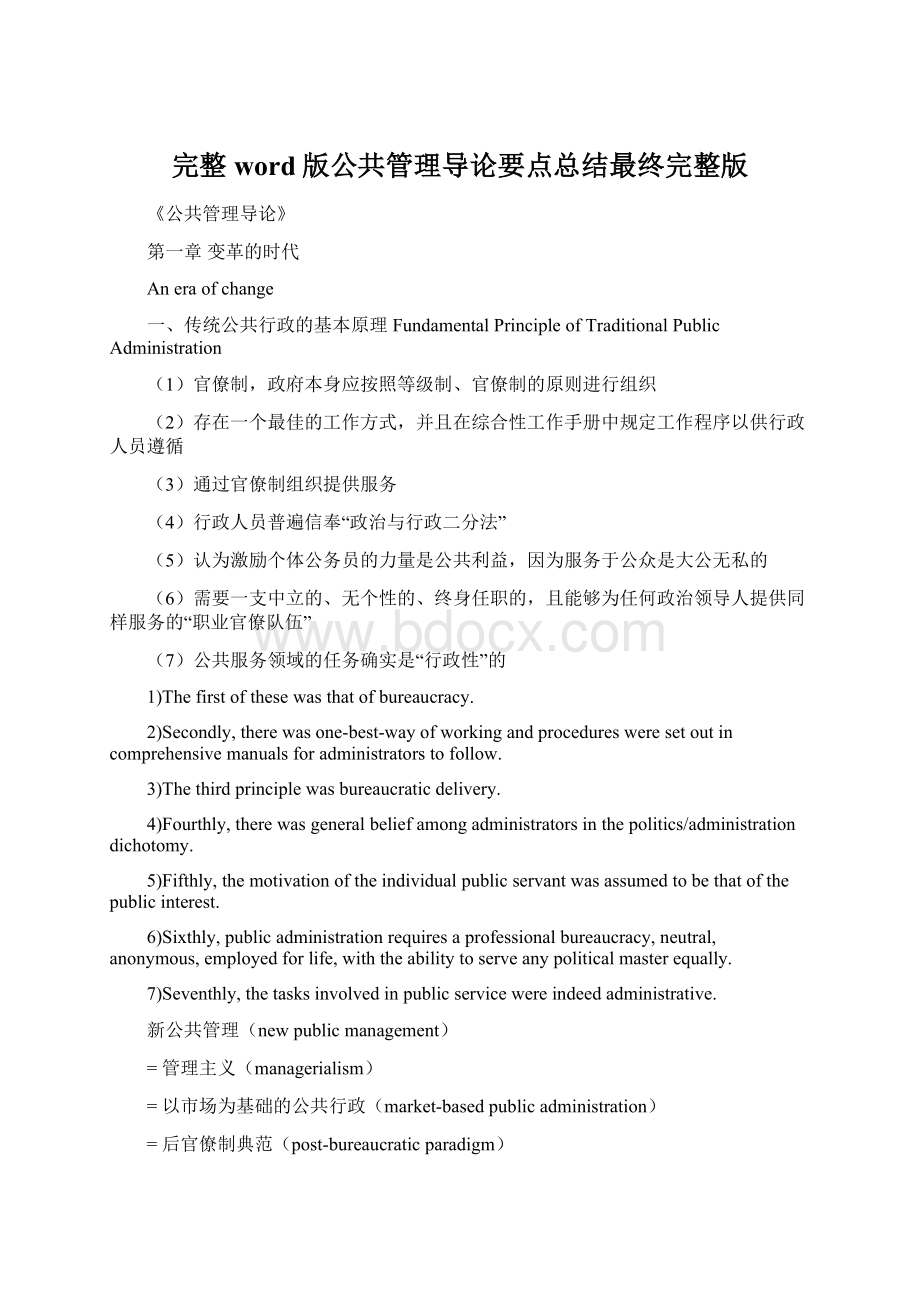完整word版公共管理导论要点总结最终完整版.docx
《完整word版公共管理导论要点总结最终完整版.docx》由会员分享,可在线阅读,更多相关《完整word版公共管理导论要点总结最终完整版.docx(13页珍藏版)》请在冰豆网上搜索。

完整word版公共管理导论要点总结最终完整版
《公共管理导论》
第一章变革的时代
Aneraofchange
一、传统公共行政的基本原理FundamentalPrincipleofTraditionalPublicAdministration
(1)官僚制,政府本身应按照等级制、官僚制的原则进行组织
(2)存在一个最佳的工作方式,并且在综合性工作手册中规定工作程序以供行政人员遵循
(3)通过官僚制组织提供服务
(4)行政人员普遍信奉“政治与行政二分法”
(5)认为激励个体公务员的力量是公共利益,因为服务于公众是大公无私的
(6)需要一支中立的、无个性的、终身任职的,且能够为任何政治领导人提供同样服务的“职业官僚队伍”
(7)公共服务领域的任务确实是“行政性”的
1)Thefirstofthesewasthatofbureaucracy.
2)Secondly,therewasone-best-wayofworkingandproceduresweresetoutincomprehensivemanualsforadministratorstofollow.
3)Thethirdprinciplewasbureaucraticdelivery.
4)Fourthly,therewasgeneralbeliefamongadministratorsinthepolitics/administrationdichotomy.
5)Fifthly,themotivationoftheindividualpublicservantwasassumedtobethatofthepublicinterest.
6)Sixthly,publicadministrationrequiresaprofessionalbureaucracy,neutral,anonymous,employedforlife,withtheabilitytoserveanypoliticalmasterequally.
7)Seventhly,thetasksinvolvedinpublicservicewereindeedadministrative.
新公共管理(newpublicmanagement)
=管理主义(managerialism)
=以市场为基础的公共行政(market-basedpublicadministration)
=后官僚制典范(post-bureaucraticparadigm)
=企业化政府(entrepreneurialgovernment)
二、行政与管理的区别Differencesbetweenadministrationandmanagement
行政从本质上是指执行指令和服务;而管理则指:
(1)实现结果;
(2)管理者实现结果的个人责任。
Administrationessentiallyinvolvesfollowinginstructionsandservice,whilemanagementinvolves:
first,theachievementofresults,andsecondly,personalresponsibilitybythemanagerforresultsbeingachieved.
三、变革的紧迫问题Imperativesofchange
①对公共部门的抨击
Theattackonthepublicsector.
②经济理论的变革:
公共选择理论;委托—代理理论;交易成本理论
Changesineconomictheory:
Publicchoicetheory,Principal/agenttheory,Transactioncosttheory
③私营部门的变革
Theimpactofchangesintheprivatesector.
④技术变革
Changesintechnology.
第二章 传统的公共行政模式
Thetraditionalmodelofpublicadministration
1.《诺思科特—特里维廉报告》标志着公共部门以功绩制为基础的任命制度的开始和恩赐制的逐步衰落。
该报告强调人事问题,虽然它的建议推行的较慢,但是它确实代表了传统的公共行政模式的产生。
通过考试择优录用、行政中立、不受任何党派控制等原则都来源于《诺思科特—特里维廉报告》。
Northcote-Trevelyansignalsthestartofmerit-basedappointmentstothepublicserviceandthegradualdeclineofpatronage.TheReportemphasizespersonnelmattersanditsrecommendationswereimplementedslowly,butitdoesrepresentabeginningtothetraditionalmodelofpublicadministration.FromNorthcote-Trevelyanderiveappointmentbymeritthroughexaminations,andnon-partisan,neutraladministration.
2.文官法案(theCivilServiceAct)的名词解释
(1)根据职位分类,为所有申请公职者举行竞争性考试;
(2)根据职位分类,任命考试成绩最高者担任公职;
(3)在正式任命前,插入一个有效的试用期;
(4)在华盛顿的任命按照某些州和其他重要地区的人口比例进行分配。
ØTheholdingofcompetitiveexaminationsforallapplicantstotheclassifiedservice.
ØThemakingofappointmentstotheclassifiedservicefromthosegradedhighestintheexaminations.
ØTheinterpositionofaneffectiveprobationaryperiodbeforeabsoluteappointment.
ØTheapportionmentofappointmentsatWashingtonaccordingtothepopulationoftheseveralstatesandothermajorareas.
3.政治与行政二分法的名词解释
官员应当负责制定政策,行政部门则应负责执行政策。
Wilsonputforththeviewthatpoliticiansshouldberesponsibleformakingpolicy,whiletheadministrationwouldberesponsibleforcarryingitout.
4.韦伯的官僚制理论
1)固定和法定的管辖范围的原则,一般是通过各种规则——法律或行政规章——来加以规定。
2)公职等级制和权力等级化原则,这意味着一种稳定而有序的上下级制度,在这种制度中,较低职位受到较高职位的监督。
3)现代公职管理是建立在保留书面文件(“档案”)的基础之上。
4)公职管理,至少是所有专门化的公职管理——而这种管理显然是现代的——通常以全面而熟练的训练为先决条件。
5)当公职得到充分发展的时候,官方活动要求官员完全发挥其工作能力
6)公职管理应遵循一般性规定,这些规定或多或少是稳定的、全面的,并且是可学习的。
ØTheprincipleoffixedandofficialjurisdictionalareas,whicharegenerallyorderedbyrules,thatisbylawsoradministrativeregulations.
ØTheprinciplesofofficehierarchyandoflevelsofgradedauthoritymeanafirmlyorderedsystemofsuper-andsub-ordinationinwhichthereisasupervisionofthelowerofficesbythehigherones.
ØThemanagementofthemodernofficeisbaseduponwrittendocumentswhicharepreserved.
ØOfficemanagement,atleastallspecializedofficemanagement–andsuchmanagementisdistinctlymodern–usuallypresupposesthoroughandexperttraining.
ØWhentheofficeisfullydeveloped,officialactivitydemandsthefullworkingcapacityoftheofficial.
ØThemanagementoftheofficefollowsgeneralrules,whicharemoreorlessstable,moreorlessexhaustive,andwhichcanbelearned.
5.泰勒的科学管理
①决定工作标准的时间和动作研究
②刺激性工资制度
③改变职能组织
ØTime-and-motionstudiestodecideastandardforworking
ØAwage-incentivesystemthatwasamodificationofthepieceworkmethodalreadyinexistence
ØChangingthefunctionalorganization
第三章 新公共管理
Publicmanagement
一、一般管理的职能Functionsofgeneralmanagement
STRATEGY战略职能(首要职能)
1)Establishingobjectivesandpriorities确定组织的目标和重点
2)Devisingoperationalplanstoachievetheseobjectives设计操作计划以实现既定目标
MANAGINGINTENALCOMPONENTS管理内部构成要素
3)Organizingandstaffing人员组织和调配
4)Directingpersonnelandthepersonnelmanagementsystem人事指挥和人事管理制度
5)Controllingperformance控制绩效
MANAGINGEXTERNALCONSTITUENCIES管理的外部要素
6)Dealingwithexternalunits处理和组织的“外部单位”
7)Dealingwithindependentorganizations处理与其他独立组织的关系
8)Dealingwiththepressandpublic处理与新闻媒体和公众的关系
二、管理方法的产生
富尔顿报告的名词解释theFultonReport
(1)在政治指导下制定政策;
(2)创立政策执行的“机构”;
(3)行政机构的运转;
(4)对议会和公众负责。
ØFormulationofpolicyunderpoliticaldirection
Øcreatingthe“machinery”forimplementationofpolicy
Øoperationoftheadministrativemachine
ØaccountabilitytoParliamentandthePublic
1978年《文官改革法》的目标是使管理者对结果负有更大的责任。
它的内容包括中层管理者的绩效工资和设定“高级行政职务”以在高层形成一个精英团体。
虽然其关注的焦点在于人事问题,但是其意图却在于改进似乎已滞后于私营部门管理的公共部门管理。
TheCivilServiceReformActof1978aimedatgivingmanagersgreaterresponsibilityforresults.ItincludedmeritpayformiddlemanagementandtheestablishmentofaSeniorExecutiveServicetoformanelitegroupatthetop.Althoughfocusedonpersonnel,itwasanattempttoimprovemanagementinthepublicsector,whichseemedtolagbehindtheprivatesector.
三、新公共管理改革
新公共管理涉及的主要论点(欧文·休斯的公共管理理论)
1)Astrategicapproach一种战略方法
2)Managementnotadministration管理而非行政
3)Afocusonresults关注结果
4)Improvedfinancialmanagement改善财政管理
5)Flexibilityinstaffing人员的弹性
6)Flexibilityinorganization组织的弹性
7)Ashifttogreatercompetition转向更激烈的竞争
8)Thenewcontractualism新合同主义
9)Astressonprivatesectorstylesofmanagementpractice对私营部门管理实践方式的重视
10)Relationshipswithpoliticians与政治官员的关系
11)Relationshipswiththepublic与公众的关系
12)Separationofpurchaserandprovider购买者与提供者的分离
13)Re-examiningwhatgovernmentdoes重新检视政府的所作所为
第四章政府的角色
Theroleofgovernment
一、公共部门与私营部门的不同Differencesbetweenprivateandpublicmanagement
1. 公共部门的决策可以是强制性的,而私营部门不具备这一特征。
2. 公共有不同与私营的责任制形式。
3. 公共服务管理者必须解决在很大程度上有政治领导人设定的外部议程。
4. 公共部门在测量产出或生产效率方面有其固有的困难。
5. 公共部门的规模和问题的多样性使得任何控制和协调都很困难。
ØFirst,inawaynotcharacteristicoftheprivatesector,publicsectordecisionsmaybecoercive.
ØSecondly,thepublicsectorhasdifferentformsofaccountabilityfromtheprivatesector.
ØThirdly,thepublicservicemanagermustcopewithanoutsideagendalargelysetbythepoliticalleadership.
ØFourthly,thepublicsectorhasinherentdifficultiesinmeasuringoutputorefficiencyinproduction.
ØFinally,thepublicsector’ssheersizeanddiversitymakeanycontrolorcoordinationdifficult.
二、“政府”与“治理”Governmentandgovernance
所谓治理,我们指的是过程与制度——既包括正式的也包括非正式的——它们指引和限制一个团体的集体活动。
而政府则是依据权威行事并创设正式义务的组织的集合。
治理并不必然专门由政府来操纵。
Bygovernance,wemeantheprocessesandinstitutions,bothformalandinformal,thatguideandrestrainthecollectiveactivitiesofagroup.Governmentisthesubsetthatactswithauthorityandcreatesformalobligations.Governanceneednotnecessarilybeconductedexclusivelybygovernments.
三、作为公共政策基础的市场失灵Marketfailureasthebasisforpublicpolicy
1.公共物品publicgoods
2.外部性externalities
3.自然垄断naturalmonopoly
4.信息不对称imperfectinformation
四、政府工具Instrumentsofgovernment
1.供应,即政府通过财政预算提供商品与服务;
2.补贴,这实际上是供应的一种补充手段,是指政府通过资助私人经济领域的某些个人以生产政府所需的商品或服务;
3.生产,是指政府生产在市场上出售的商品和服务;
4.管制,是指政府运用国家的强制性权力允许或禁止私人经济领域的某些活动。
ØProvision,wherethegovernmentprovidesgoodsorservicesthroughthegovernmentbudget.
ØSubsidy,whichisreallyasub-categoryofprovisionandiswherethegovernmentassistssomeoneintheprivateeconomytoprovidegovernment-desiredgoodsorservices
ØProduction,wheregovernmentsproducegoodsandservicesforsaleinthemarket
ØRegulation,whichinvolvesusingthecoercivepowersofthestatetoalloworprohibitcertainactivitiesintheprivateeconomy.
五、政府干预的阶段Phrasesofgovernmentintervention
1.自由放任的社会Thelaissez-fairesociety
2.福利国家的产生Theriseofthewelfarestate
3.新古典主义Neoclassicism
Ø个性假设理论
Theassumptionofindividualrationality
Ø精心构筑基于上述假定的模型
Theelaborationofmodelsfromthisassumption
Ø市场角色最大化
Amaximumroleformarketforces
Ø政府角色最小化
Aminimumroleforgovernment
4.政府的回归Governmentmakesacomeback
六、政府的基本职能Basicfunctionsofgovernment
世界银行在其1997年的世界发展报告中指出,“每一个政府的核心使命”包含了五种基本的角色。
这些角色是:
(1)确立法律基础;
(2)保持一个健康的政策环境,包括保持宏观经济的稳定;
(3)投资于基本的社会服务和社会基础设施;
(4)保护弱势群体;
(5)保护环境。
ØEstablishingafoundationoflaw
ØMaintaininganon-distortionarypolicyenvironment,includingmacroeconomicstability
ØInvestinginbasicsocialservicesandinfrastructure
ØProtectingthevulnerable
ØProtectingtheenvironment
第五章公共企业
Publicenterprise
一、建立公共企业的理由Reasonsforestablishingpublicenterprise
1. 纠正市场失灵
2. 改变经济中的支付结构
3. 推动中央集权的长期计划
4. 经济性质由资本主义转为社会主义
ØTo‘correct’marketfailure
ØToalterthestructureofpay-offsinaneconomy
ØTofacilitatecentralizedlong-termeconomicplanning
ØTochangethenatureoftheeconomy,fromcapitalisttosocialist
二、公共企业Publicenterprise
公共企业的定义
公共企业是一种特殊的法人机构:
它向公众大规模地出售商品和服务,赢利首先归其自身所有。
Apublicenterpriseisaparticularkindofstatutoryauthority:
onethatsellsgoodsandservicestothepubliconalargescale,withthefinancialreturnsaccruinginthefirstinstancetotheauthorityitself.
公共企业的类型
1.公用事业publicutilities
2.